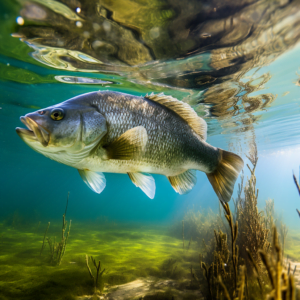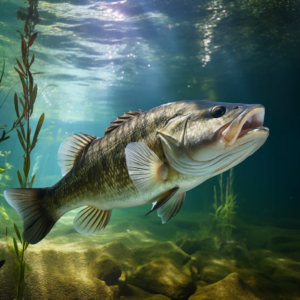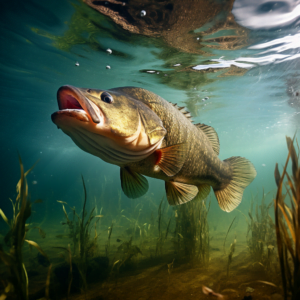So, have you ever wondered what eats bass in the ocean? I mean, we all know that bass are pretty tasty and sought after by anglers, but what about the predators that lurk beneath the surface? Well, I’m here to satisfy your curiosity and give you the lowdown on the content predators of bass in the ocean.
First things first, let’s talk about the variety of fish that consider bass to be a prime meal. Sharks, for one, are definitely up there on the list. They have a keen sense of smell and can easily detect the oil and chemicals that bass produce. Tuna, marlin, and other large predatory fish are also known to snack on bass. These fish have the advantage of speed and agility, making them formidable predators in the open ocean.
But it’s not just the big fish that pose a threat to bass. There are also smaller predators that partake in the feast. Seals and sea lions, for example, are known to gobble up bass whenever they get the chance. These playful mammals may look innocent, but they have an appetite for fish that rivals even the fiercest sharks.
Well, there you have it. The ocean is home to a diverse range of predators that consider bass to be a delectable treat. If you’re interested in learning more about these content predators and their hunting techniques, be sure to check out the article. It’s fascinating how nature works, isn’t it?
Introduction
Have you ever wondered what lurks beneath the surface of the ocean? The world beneath the waves is teeming with life, and each species has its role to play in the intricate ecosystem. One such species is the bass, a popular game fish sought after by anglers and prized for its delicious flavor. But did you know that the bass is not at the top of the food chain? In fact, there are several predators that hunt bass in the ocean. In this article, we will explore the predators of bass and delve into their hunting techniques and ecological importance.
Predators of Bass
Sharks
Sharks are often portrayed as fearsome creatures, and for good reason. These powerful predators have been around for millions of years and have evolved into efficient hunters. When it comes to feeding, sharks are opportunistic and will not hesitate to make a meal out of a bass if given the chance.
Great White Shark
The great white shark, often referred to as the “king of the ocean,” is undoubtedly one of the most well-known predators in the world. With its powerful jaws and rows of sharp teeth, it is perfectly adapted for hunting. These apex predators can grow up to 20 feet in length and weigh over 5,000 pounds. While they primarily feed on marine mammals, they have been known to target smaller fish like bass when other food sources are scarce.
Tiger Shark
Another formidable predator that poses a threat to bass is the tiger shark. Named after its distinctive dark stripes, these sharks are known for their indiscriminate feeding habits. They are opportunistic scavengers and have a reputation for eating just about anything, including bass. With their powerful jaws and serrated teeth, tiger sharks can easily overpower their prey, making them a force to be reckoned with in the ocean.
Dolphins
Dolphins are often associated with intelligence and grace, but they too have a carnivorous side. While they primarily feed on fish like herring and mackerel, they have been known to prey on bass on occasion.
Bottlenose Dolphin
The bottlenose dolphin is perhaps the most well-known and beloved species of dolphin. They are highly social animals that often travel in pods, making them formidable hunters. With their exceptional speed and agility, bottlenose dolphins can chase down bass and other fish, using strategic teamwork to corral their prey. However, bass are not their preferred food source, and they are more likely to be opportunistic hunters when it comes to targeting these tasty fish.
Orca
The orca, also known as the killer whale, is the largest member of the dolphin family and is renowned for its hunting prowess. While they primarily feed on marine mammals like seals and sea lions, they are known to take advantage of any available food source, including bass. Orcas are highly intelligent and use sophisticated hunting strategies to catch their prey. They work together in coordinated pods and can deliver powerful blows to stun their prey before devouring it.
Seals
Seals may appear adorable and innocent, but they are skilled hunters in their own right. While they predominantly consume fish like herring and sardines, bass are not safe from their predatory instincts.
Leopard Seal
Leopard seals are formidable predators that inhabit the cold waters of the Antarctic. Known for their powerful jaws and sharp teeth, they are top predators in their environment. While their diet mainly consists of penguins and other marine mammals, they have been observed hunting bass when the opportunity arises. With their sleek and agile bodies, leopard seals can quickly close in on their prey, making them a significant threat to bass populations.
Harbor Seal
Harbor seals are another predator that bass should be wary of. These seals are found in coastal waters around the world and are primarily fish eaters. While bass may not be their primary target, harbor seals have been known to snack on these fish when available. With their streamlined bodies and excellent underwater vision, they can easily spot and catch a bass swimming by.
Hunting Techniques
Now that we have explored the predators of bass in the ocean, let us take a closer look at the hunting techniques employed by these creatures.
Ambush Predators
Some predators rely on the element of surprise to catch their prey. These ambush predators lie in wait, patiently waiting for the perfect opportunity to strike.
Lying in Wait
Ambush predators such as the great white shark and the leopard seal use this technique to their advantage. They patiently wait near areas frequented by bass, blending into the surroundings and remaining motionless until their prey comes within striking distance. Once the bass is within reach, these predators unleash their lightning-fast strikes, ensuring a successful hunt.
Camouflaging
Another tactic employed by ambush predators is camouflaging. For example, the leopard seal has a mottled pattern on its fur, allowing it to blend in with the icy waters of the Antarctic. This camouflage helps them approach their prey undetected, increasing their chances of a successful hunt.
Chase Predators
Other predators are more active in their pursuit of bass. These chase predators utilize their speed and agility to relentlessly pursue and capture their prey.
High-Speed Pursuit
Dolphins, such as the bottlenose dolphin and the orca, are known for their high-speed pursuit hunting technique. These predators can swim at impressive speeds, easily overtaking bass as they dart through the water. Using their streamlined bodies and powerful tails, dolphins can quickly close the distance and catch the bass before it has a chance to escape.
Group Hunting
Many predators, including dolphins and orcas, engage in group hunting. They work together as a coordinated team, using their numbers to corral and trap the bass. This collaborative effort greatly increases their chances of success and ensures that no bass can escape their grasp.
Ecological Importance
While the predator-prey relationship may seem brutal, it serves an essential ecological purpose in maintaining balance within the ocean ecosystem.
Maintaining Balance
Predators play a crucial role in controlling the population of their prey. By hunting and consuming bass, sharks, dolphins, and seals help prevent overpopulation, ensuring that the ecosystem remains in balance. Without these predators, the bass population could explode, leading to negative consequences for other species and the overall health of the marine ecosystem.
Impact on Prey Populations
The presence of predators can also have an impact on the behavior and distribution of their prey. The fear of being hunted influences the movements and feeding patterns of bass, forcing them to adapt their behavior to evade detection. This constant pressure from predators can shape the evolution of the bass population, favoring individuals that are faster, more agile, and better equipped to avoid becoming a meal.
Conclusion
In the vast and mysterious world beneath the waves, bass are not immune to the dangers that lurk. Sharks, dolphins, and seals all pose a significant threat to these prized game fish. Whether through ambush or pursuit, these predators employ a range of hunting techniques to secure their next meal. While their actions may seem ruthless, they play a vital role in maintaining balance within the ocean ecosystem. So, the next time you cast your line and hook a bass, remember that you are not the only one vying for its tasty flesh.




